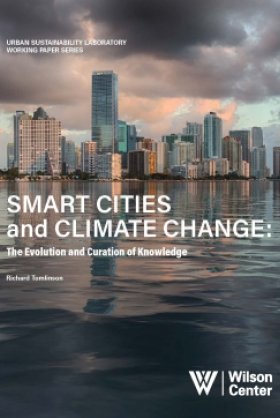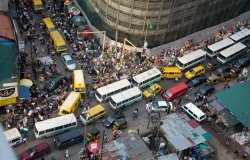The Role of the City in State Stability
Overview
Sustained economic and social development and democratic governance are impossible within the framework of a failed state. Conditions of instability and insecurity that arise from terrorism, organized crime, pandemic disease, and extreme poverty cannot be overcome without a functioning state. Policies to fix failed states must begin with an understanding of how to fix failing cities. On September 27th, the Comparative Urban Studies Project sponsored a seminar, The Role of the City in State Stability, which explored the increasingly vital role cities play in the developing world, particularly in terms of how they can promote economic growth, foster norms of democratic participation and create models of how to deliver services. Panelists William Cobbett, Cities Alliance, Ronald W. Johnson, RTI, and Eduardo Rojas, Inter-American Development Bank, considered cities, which are recovering or are recovered from conflict, and examined how improved development in urban areas is an essential part of the development policy agenda.
William Cobbett began by outlining the importance of framing policy questions. Specifically, he pointed out that one must consider what causes cities to fail. Disaster, the disempowerment of city governance, social exclusion, the incapacity of local governments to provide basic services to its constituents, and government inefficiencies were all named as potential points of collapse. Cobbett argues that a city needs an empowered local government, strong institutional arrangements, and pro-active policy to combat the problems of failing states.
Ronald W. Johnson contends that there is a high correlation between good local governance and successful, stable systems. He presented lessons from RTI's USAID sponsored local governance project in Iraq. The local government of Iraq's previous regime offered few opportunities for participation at the local level. The system was run by governors and department heads appointed by the center. The regime created conflict among groups, and then used conflict as excuse to eradicate groups and centralize control. Consequently, new local governance systems have been set up in the form of representative councils to deconcentrate ministry departments and give a voice to Iraqi citizens. This local governance structure is essential because it serves as a laboratory for experimentation with governance and democratic processes, it fills a vacuum of civil administration, it provides a training ground for political and conflict resolution and it serves as a base for state stability.
Eduardo Rojas presented a Latin American perspective on the role of cities in state stability. In Latin America, cities are particularly important for economic development and for the well being of the population. The concentration of population and economic activities in cities generates conditions that compound structural problems affecting Latin American societies and ultimately the stability of the state. Solutions to state stability require improving urban governance. Good urban governance exists when the institutions in charge of regulating urban life and providing services have efficient programs and rules, and are able to put them into practice. Key factors to improving urban governance include the structure of intergovernmental organizations, system of governance, institutional capacity and financing.
Hosted By

Urban Sustainability Laboratory
Since 1991, the Urban Sustainability Laboratory has advanced solutions to urban challenges—such as poverty, exclusion, insecurity, and environmental degradation—by promoting evidence-based research to support sustainable, equitable and peaceful cities. Read more
Thank you for your interest in this event. Please send any feedback or questions to our Events staff.









